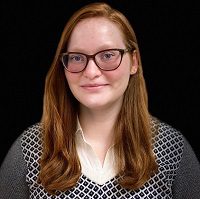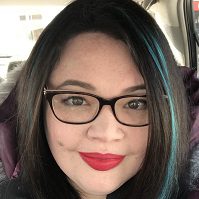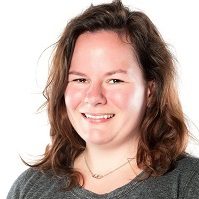Laboratory students are facing new issues due to COVID-19, like the transition to online classes, delayed or shortened clinical rotations, and limited access to certification exams. Despite general feelings of uncertainty, many have shown considerable resilience and made the most of their situations. Below, each of the new Developing Professionals Forum officers share their personal stories through the lens of a pandemic.
 Kate Hadlich, Developing Professionals Forum Chair
Kate Hadlich, Developing Professionals Forum Chair
As I reflect on the ways COVID-19 has impacted me personally, I am also reminded of the ways it has helped our profession grow. For example, COVID-19 has presented laboratorians with the momentum and platform from which we can educate the public about our important role on the healthcare team. Additionally, it has created an environment through which we can share our expertise.
Recently, my family and friends have shown an increased interest in what I do and even ask me about things they see in the news or on social media, like vaccines, herd immunity, and antibodies. The ASCLS Code of Ethics states, “As practitioners of an autonomous profession, Medical Laboratory Professionals have the responsibility to contribute from their sphere of professional competence to the general wellbeing of society.” COVID-19 is an excellent opportunity for us to share our knowledge—with family, friends, the media, and legislators.
The ASCLS Code of Ethics also states, “Medical Laboratory Professionals work with all patients and all patient samples without regard to disease state, ethnicity, race, religion, or sexual orientation.” I think the saying, “the patient comes first,” nicely summarizes this quote. In the face of a pandemic, medical laboratory professionals have conquered their personal fears and stepped up to the challenge. They continue to test all patient samples, including those from COVID-19 positive patients. During my clinical rotations at Promedica in Toledo, Ohio, I realized how easy it is to forget that each sample belongs to a person, but I also learned to recognize the enormous impact that a test result, like COVID-19, can have on that person’s life.
Find Kate on ASCLS Connect.
 Sara Oswald, Developing Professionals Forum Vice Chair
Sara Oswald, Developing Professionals Forum Vice Chair
Being a laboratory student during the challenging times in which we live has turned out to be an invaluable experience. Certainly there have been some aspects that haven’t been ideal, such as having to undergo COVID testing before I could be allowed on campus, missing out on valuable clinical hours when I was required to self-isolate after I developed a non-COVID-related illness, and not knowing what any of my new instructors and mentors actually look like below the eyes. Ultimately, however, I feel privileged to be allowed a front-row seat watching history be made on the frontlines of the epidemic by everyday laboratorians.
I am currently in my blood bank clinical rotation at St. Mary’s Hospital in Grand Junction, Colorado, which supplies many of the blood products for the Western Slope of Colorado, as well as Eastern Utah. It has been an exciting whirlwind of new information and experiences, and in the midst of them, I have been able to witness how convalescent plasma is being collected and used both therapeutically and for continuing SARS-CoV-2 research. I have also been able to see the implementation of exciting new community screening methods, such as the RT-LAMP saliva assay. And I have been able to witness the robust nature of the scientific community as we continue to study and scrutinize test methodologies approved under Emergency Use Authorizations (EUA), resulting in some of those EUAs being withdrawn. This is not an easy time to be a student. But there has never been a better time to learn.
Find Sara on ASCLS Connect.
 Heather Herrington, Developing Professionals Forum Secretary
Heather Herrington, Developing Professionals Forum Secretary
Two years ago, I applied to the post baccalaureate MLS certificate program at George Washington University. Never in a million years would I have anticipated wrapping up my clinical rotations during a global pandemic. While I wish we were all living in less interesting times, this situation has vividly illustrated how those in the medical laboratory community can switch gears and make valuable contributions.
I have done my rotations at the University of Pittsburgh Medical Center (UPMC) and Vitalant in Pittsburgh. When I was in the Chemistry Department at UPMC, I spent some time in the Serology Lab, which had asked its employees for volunteers to both run the test for SARS-CoV-2 and help with various research projects. One of the laboratory professionals noticed a pattern with some of the data and was able to suggest that a medical resident investigate further, potentially as a postdoctoral project. Prior to that experience, it had never even occurred to me that we, as laboratorians, could contribute to medical research by helping to determine what should be studied. We are truly an integral part of the healthcare team, and our role is even bigger than what I had previously considered.
Find Heather on ASCLS Connect.
The Developing Professionals Forum is open to all ASCLS Developing Professional (student) members. Learn more.

 Kate Hadlich, Developing Professionals Forum Chair
Kate Hadlich, Developing Professionals Forum Chair Sara Oswald, Developing Professionals Forum Vice Chair
Sara Oswald, Developing Professionals Forum Vice Chair Heather Herrington, Developing Professionals Forum Secretary
Heather Herrington, Developing Professionals Forum Secretary